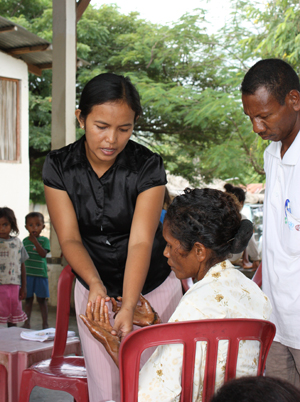
SUSAN MASIMA reports…
The World Health Organisation is moving closer to eliminating leprosy as a public health problem in East Timor but the disease is far from being eradicated in the country, according to one Australian leprosy health worker.
Natalie Smith, interim country leader of The Leprosy Mission in Dili, said there was still a strong need to educate government health workers and the community at large in leprosy awareness to ensure diagnosis and treatment were sought early to stop the disease in its tracks.

A leprosy health worker, trained under The Leprosy Mission’s program , checks a local woman for signs of leprosy. PICTURE: Courtesy of The Leprosy Mission
“Announcing that leprosy is eliminated as a public health problem in East Timor will not mean that leprosy is gone, it is still there, it just means that leprosy is below one case per 10,000.’’
– Natalie Smith, interim country leader of The Leprosy Mission in East Timor
Community education to correct the myths and stigma towards the disease was also needed to prevent people from feeling shame, hiding their condition and failing to seek medical treatment such as multi-drug therapy, she said.
Ms Smith, an occupational therapist, made her comments to a group of supporters with The Leprosy Mission Australia, while on home-leave in Melbourne.
“Announcing that leprosy is eliminated as a public health problem in East Timor will not mean that leprosy is gone, it is still there, it just means that leprosy is below one case per 10,000,’’ she said.
“East Timor as a whole will probably reach that very soon but in the isolated enclave of Oecussi, the level is still seven leprosy cases per 10,000, which means it is still a big problem in that area…(T)here are also people in the country who still hide their skin condition because of stigma, so the problem is not solved.’’
Ms Smith oversees a capacity building project run in conjunction with the Timor Leste Ministry of Health which provides training and support to government health workers in leprosy detection and treatment. So far the project has seen more than 300 health workers from district community health centres trained in leprosy awareness.
TLM community rehabilitation project workers are also in Oecussi helping to initiate self-help support groups for people affected by leprosy and providing them with small micro-credit business loans to encourage their independence.
“If we reach elimination, we (TLM) have played a significant part in that,’’ Ms Smith said. “We have pretty much provided all the training of health workers to detect leprosy – it is a big achievement. With leprosy, it is all about raising awareness and getting the knowledge out there in the community, that leprosy can be cured with multi-drug therapy. It is ignorance that prevents people from getting well.
“We are planning to do more work in 2011 in community education so that family members know how to detect leprosy, not just health workers.”
Ms Smith said educating family members that leprosy was a disease caused from an airborne bacteria and not a curse caused by eating forbidden foods or the wrongdoing of a parent was also vital.
She said parents who had children with general and leprosy-specific disabilities, often kept their children hidden.
“We have found that parents will be ashamed to bring their children out, they will keep them hidden in back rooms, they won’t let them go to school or play with other children,’’ Ms Smith said.
“They don’t think anybody can help them so the children are often neglected. We want to correct these attitudes.’’
Training government health workers in rural regions was also important to helping 70 per cent of the country’s population which lived in mountainous terrain and could not afford public transport to Dili, she said.
Out of 30 TLM international projects, Ms Smith is only one of three program leaders who are foreigners. She is preparing to train a Timorese health worker to perform her role in 2011 and mentor them for 12 months.
Susan Masima is a writer for The Leprosy Mission Australia.





